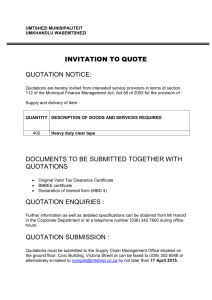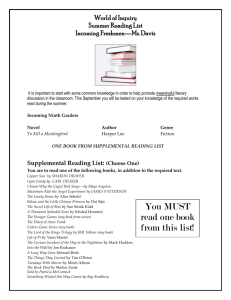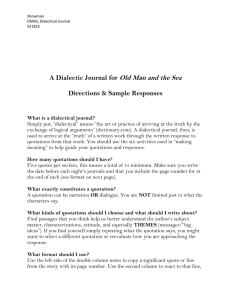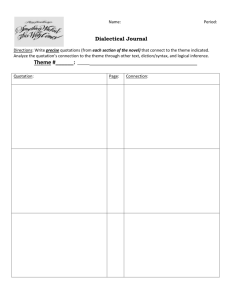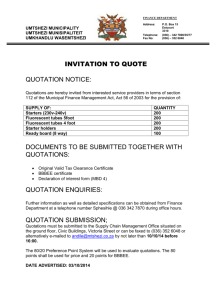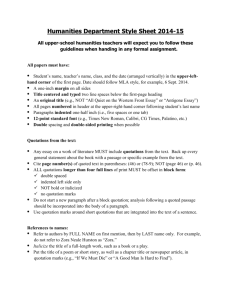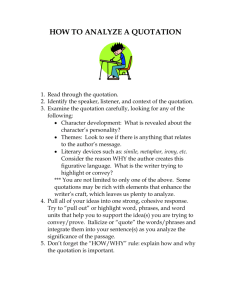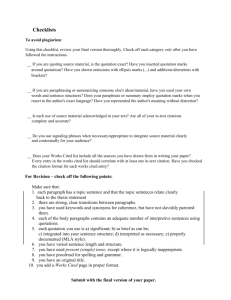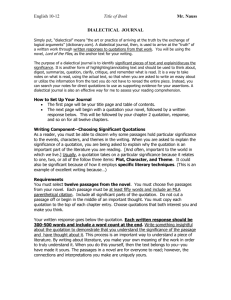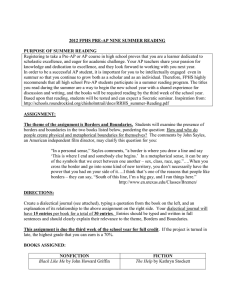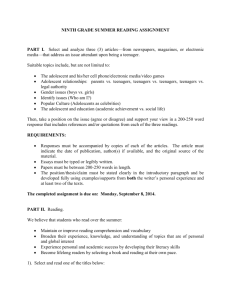Dialectical Journal Directions
advertisement
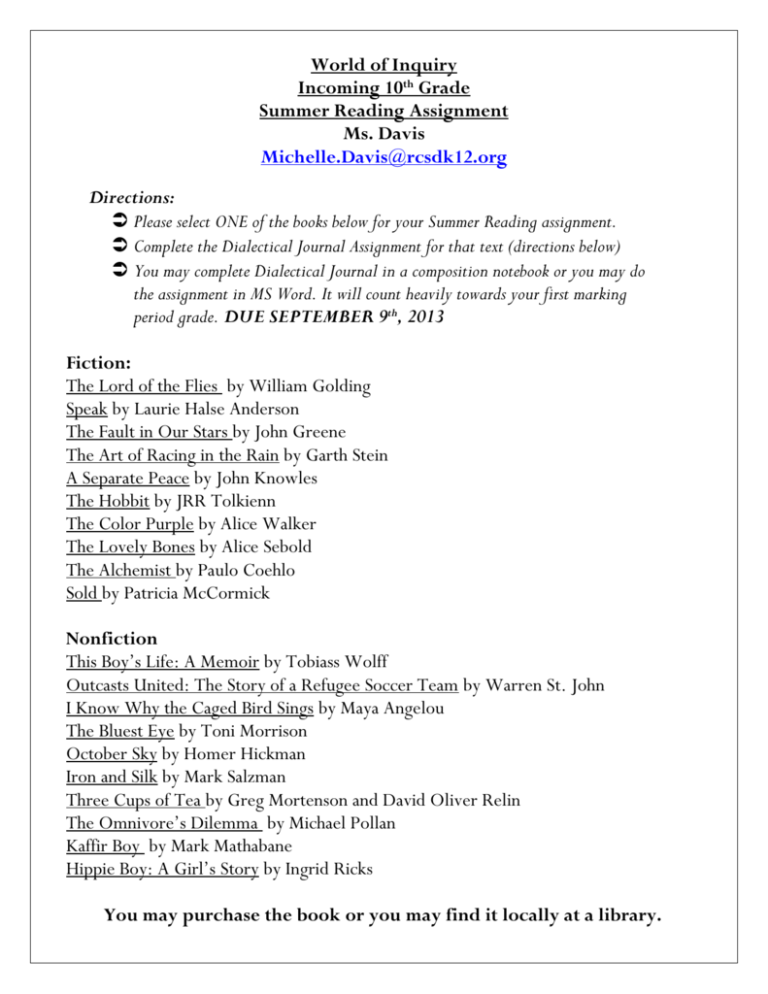
World of Inquiry Incoming 10th Grade Summer Reading Assignment Ms. Davis Michelle.Davis@rcsdk12.org Directions: Please select ONE of the books below for your Summer Reading assignment. Complete the Dialectical Journal Assignment for that text (directions below) You may complete Dialectical Journal in a composition notebook or you may do the assignment in MS Word. It will count heavily towards your first marking period grade. DUE SEPTEMBER 9th, 2013 Fiction: The Lord of the Flies by William Golding Speak by Laurie Halse Anderson The Fault in Our Stars by John Greene The Art of Racing in the Rain by Garth Stein A Separate Peace by John Knowles The Hobbit by JRR Tolkienn The Color Purple by Alice Walker The Lovely Bones by Alice Sebold The Alchemist by Paulo Coehlo Sold by Patricia McCormick Nonfiction This Boy’s Life: A Memoir by Tobiass Wolff Outcasts United: The Story of a Refugee Soccer Team by Warren St. John I Know Why the Caged Bird Sings by Maya Angelou The Bluest Eye by Toni Morrison October Sky by Homer Hickman Iron and Silk by Mark Salzman Three Cups of Tea by Greg Mortenson and David Oliver Relin The Omnivore’s Dilemma by Michael Pollan Kaffir Boy by Mark Mathabane Hippie Boy: A Girl’s Story by Ingrid Ricks You may purchase the book or you may find it locally at a library. Dialectical Journal Assignment The purpose of a dialectical journal is to identify momentous pieces of text and explain their significance. It is another form of highlighting/annotating text and should be used to think about, digest, summarize, question, clarify, critique, and remember what is read. It is a way to take notes on what is read, using the actual text, so that when students are asked to write an essay about or utilize the information from the text they do not have to reread the entire piece. Instead, they can search their notes for direct quotes to use as supporting evidence for their opinions. In effect, you will be holding a discussion with yourself on key points, asking questions, reacting to particular phrases that drew your attention, etc. We will then use your comments as a starting place for class discussion over assigned reading. You will identify 20 KEY QUOTATIONS/PASSAGES that you think are especially significant. You will then write a detailed analysis of that quotation or passage. In your journal, you will re-write the passage/quotation and page number and your analysis of the passage. (See sample below) Your analysis should be at least ONE long paragraph. Your journal will count for 25% of your grade for first marking period. Therefore, failure to do the assignment could result in a failing grade. On Plagiarism: Assignments must be completed individually, without collaboration with other people (namely, students) or outside reading resources (including the internet). Plagiarized work will receive a zero and disciplinary consequences will ensue. Dialectical Journal Directions You can purchase a composition notebook for this or you can type it using a word processor. The purpose of a dialectical journal is to produce meaningful responses as you read a piece of literature. It is not a tool for recording the plot, but instead a tool for understanding the deeper meanings and artistry of the work. It is similar to, but not the same as the reader response strategies you developed in middle school. Your journal will consist of quotations from the novel and your responses to those quotes. Occasionally you may reference an event or moment from the text that is larger than a single quote. First you should type the textual evidence: the quotation (exactly, in quotation marks) or the specific event summary, followed in either case by the page number in parentheses. On the next line, type your response to this textual evidence. Your response should consist of multiple complete sentences. If you wish, you may do this in a double-column format (not required). Why do I choose a quotation and how do I respond? We are particularly interested in responses that are connections (especially text-to-text and text-to-world), questions (as long as you hypothesize about the answers), and especially inferences. Remember that these applications may need to be longer than you are accustomed to writing. In addition, there are other reasons to select quotations including: *epiphany – seeing something you didn't see before *character insights – motives, symbolic representation, reasons for conflicts/relationships *recognition of patterns – overlapping images, repetitions of idea, details structural or content shifts *author's style – use of certain words, phrases, sentence structures, tone, etc. *effective use of stylistic/literary devices – interpret imagery, figures of speech, symbols, allusions, etc. and give possible explanations *realization of a deeper meaning or theme that is running throughout the novel Try to avoid obvious or shallow observations. (Scout had a brother who teased her; my brother teases me.) Remember that we are looking for the depth of your thought – your ability to go beyond the text and think about the literary artistry and “big picture” meanings. Connect to other texts, historical context, the “how” in addition to the “what,” and the rhetorical devices the text presents. Also of Note: Please record your quotations/responses in the order they appear in the novel. If you wish to avoid the “start and stop” method of note-taking, place small “post-it notes” in your text and come back to type them later. A strong journal will have 25+ quotations and responses that cover the entire length of the novel. The responses should be yours and not copied from any source. Plagiarism—using ideas or information from the internet (such as Sparknotes or whatever)—is unacceptable and will be taken seriously. Please feel free to email me if you have any questions: Michelle.Davis@rcsdk12.org SEE SAMPLES BELOW…. Sample Student Quotes and Responses (These are actual student responses written about other texts.) SAMPLE QUOTATION FROM TEXT: “How could you communicate with the future? It was of its nature impossible” (6). Here the theme of time (past, present, and future) is alluded to, which is a common theme throughout the novel. In this situation, Winston is struggling with the issue of communicating with the future because he realizes that links to the past help explain the present society. He wants the future to have the benefit of history which he lacks so he rebels and creates the journal. This is a theme that is present throughout other dystopian texts. We can observe that the uncertainty of the future as a result of political conflict in the 20 th century was a likely cause of this prevalent theme. SAMPLE QUOTATION FROM TEXT: “Of course he chanted with the rest: it was impossible to do otherwise. To dissemble your feelings, to control your face, to do what everyone else was doing, was an instinctive reaction” (15). I wonder why Wilson did this if he didn’t believe what the other people believed. Maybe he really wants to fit in. I think the passage shows the tendency of human nature to assimilate to those around them and to get caught up in an excited group without necessarily agreeing with the cause. It shows what peer pressure is like and how humans have a need to belong that sometimes goes beyond their individuality and reasonable thoughts. We as readers struggle to find our own identities much as these characters do. This universal concern is what draws the reader in. SAMPLE QUOTATION FROM TEXT: “Don’t you see that the whole aim of Newspeak is to narrow the range of thought?” (46). The government's objective is to make people ignorant, which allows the party to be more in control because if people don’t know what is going on, the government can manipulate them. This could be a satire for government control/ignorance of people. I think the author is trying to show how bad and wrong this is – pointing out how ridiculous it is and how this is the opposite of what a government should do, though many governments probably operate this way. The readers get engaged here; it makes us consider the extent we have been manipulated by our own governments. SAMPLE QUOTATION FROM TEXT: “Fire and brimstone alright, but hidden in lacy groves” (7). This illustrates the idea of ambiguity or even appearance contradicting reality. Sethe seems to have mixed feelings about Sweet Home. Of course she despises it because of what she suffered there, but also it is such an integral part of her, I don’t think she could ever deny it. The nature images of “lacy groves” and later the tree and the corn husks, suggest a sort of beauty about the place. Perhaps it is romanticized simply because it is part of the past, or because it has become distorted in characters’ memories.
